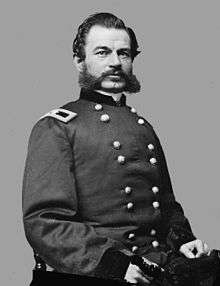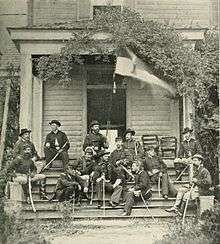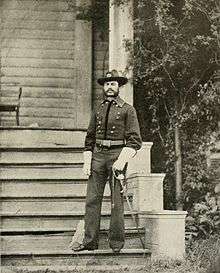Alfred Thomas Archimedes Torbert
| Alfred Thomas Archimedes Torbert | |
|---|---|
 General Alfred Thomas Torbert | |
| Born |
July 1, 1833 Georgetown, Delaware |
| Died |
August 29, 1880 (aged 47) Atlantic Ocean (off Cape Canaveral, Florida) |
| Place of burial | Methodist Episcopal Cemetery, Milford, Delaware |
| Allegiance |
United States of America Union |
| Service/branch |
United States Army Union Army |
| Years of service | 1855–1866 |
| Rank |
|
| Commands held |
1st New Jersey Volunteer Infantry First New Jersey Brigade |
| Battles/wars | American Civil War |
Alfred Thomas Archimedes Torbert (July 1, 1833 – August 29, 1880) was a career United States Army officer, a Union Army General commanding both infantry and cavalry forces in the American Civil War, and a U.S. diplomat.
Early life


Torbert was born in Georgetown, Delaware. He graduated 21st in a class of 34[1] from the United States Military Academy in 1855 and was commissioned a brevet second lieutenant in the 2nd U.S. Infantry Regiment.
Civil War
Just before the start of the Civil War, Torbert was appointed a first lieutenant in the Confederate States Army on March 16, 1861, but he refused the appointment and remained a lieutenant in the U.S. Army. By September 16, he was appointed colonel of the 1st New Jersey Infantry and, by August 29, 1862, he was a brigade commander in the VI Corps of the Army of the Potomac. In the Maryland Campaign of 1862, he was wounded at Crampton's Gap in the Battle of South Mountain. He was promoted to brigadier general on November 29, 1862. Torbert commanded his New Jersey brigade in the campaigns leading to the Battle of Fredericksburg, the Battle of Chancellorsville, and the Battle of Gettysburg.
On April 10, 1864, Torbert was given command the 1st Division of the Cavalry Corps of the Army of the Potomac, following the death of Maj. Gen. John Buford. Torbert commanded during the Overland Campaign, except when ill following the Battle of Spotsylvania Courthouse. Brig. Gen. Wesley Merritt commanded in his place for a time. During Maj. Gen. Philip Sheridan's Valley Campaigns of 1864, Torbert commanded the Cavalry Corps of the Army of the Shenandoah and was promoted to brevet major general on September 9, 1864. Sheridan was unhappy with the performance of the cavalry at the time of the Battle of Fisher's Hill. He is said to have told Torbert to go out and "whip or be whipped."[2] The result was a defeat for the Confederate cavalry in the Battle of Tom's Brook.
Torbert commanded the vestigial Army of the Shenandoah from April 22 to June 27, 1865. Merritt commanded Torbert's former corps under Sheridan in the last campaigns of the Civil War in Virginia. Torbert received brevet promotions in the regular army for his service at Gettysburg, Haw's Shop, Third Winchester, and Cedar Creek.
Postbellum career
After the war, Torbert served in a number of diplomatic posts: as U.S. Consul to El Salvador in 1869, U.S. Consul General in Havana in 1871, and U.S. Consul General in Paris in 1873.
Alfred Torbert drowned off Cape Canaveral, Florida, in the sinking of the S.S. Vera Cruz on August 29, 1880. Eyewitness accounts claimed he swam for over 20 hours. He died on the shore shortly thereafter. His body was recovered August 31, 1880, and he is buried in the Methodist Episcopal Cemetery, Milford, Delaware.
In memoriam
In 2008, a statue honoring General Torbert was erected in Milford.[3]
See also
Notes
- ↑ Swank, p. 48.
- ↑ Longacre, p. 29.
- ↑ Milford Beacon article, July 4, 2008.
References
- Eicher, John H., and David J. Eicher. Civil War High Commands. Stanford, CA: Stanford University Press, 2001. ISBN 0-8047-3641-3.
- Longacre, Edward G. The Cavalry at Appomattox: A Tactical Study of Mounted Operations During the Civil War's Climactic Campaign, March 27 – April 9, 1865. Mechanicsburg, PA: Stackpole Books, 2003. ISBN 978-0-8117-0051-1.
- Swank, Walbrook Davis. Battle of Trevilian Station: The Civil War's Greatest and Bloodiest All Cavalry Battle, with Eyewitness Memoirs. Shippensburg, PA: W. D. Swank, 1994, ISBN 0-942597-68-0.
- "The Wrecked Steamship: City of Vera Cruz." New York Times, September 5, 1880.
Further reading
- Wittenberg, Eric J. Glory Enough For All: Sheridan's Second Raid and the Battle of Trevilian Station. Washington, DC: Brassey's, Inc., 2001. ISBN 1-57488-468-9.
- Memoirs of General P. H. Sheridan Project Gutenberg Etext of Memoirs of General P. H. Sheridan
External links
- "Alfred Thomas Archimedes Torbert". Find a Grave. Retrieved 2008-02-12.
- General Torbert homepage
| Diplomatic posts | ||
|---|---|---|
| Preceded by Alpheus S. Williams |
United States Minister Resident to El Salvador October 27, 1869–May 10, 1871 |
Succeeded by Thomas Biddle |